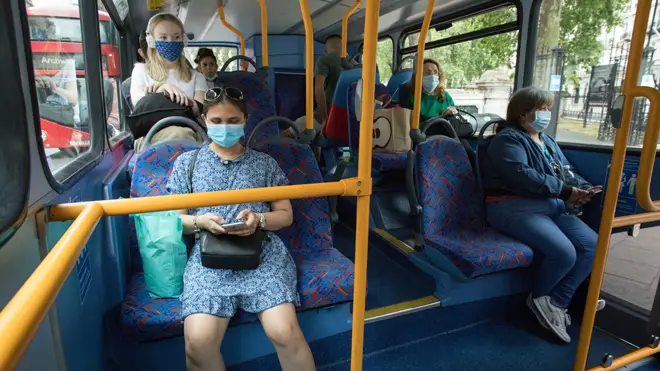
Ali Miraj 12pm - 3pm
15 March 2021, 12:10

The Government has unveiled ambitious £3bn plans to make buses more frequent, cheaper, greener and easier to use to try and get more people out of the cars and onto public transport.
The Prime Minister is unveiling a shake-up of the bus sector which aims to see lower, simpler flat fares in towns and cities, turn-up-and-go services on main routes, and new "flexible" services to reconnect communities.
The strategy will see passengers across England benefiting from more frequent, more reliable, easier to use, better coordinated and cheaper bus services, the Department for Transport (DfT) said.
Changes include hundreds of miles of new bus lanes, fares with daily price caps so people can use the bus as many times a day as they need, more services in the evenings and at weekends, and all buses accepting contactless payments.
READ MORE: Turkey plans to welcome unvaccinated British holidaymakers
To help people easily move from bus to train, there will be integrated services and ticketing across all transport modes, the DfT said.
The Government is promising to deliver 4,000 new British-built electric or hydrogen buses, transition cities and regions across England to emission-free buses, and safeguard the UK bus manufacturing industry.
It is pledging to end sales of new diesel buses, and has launched a consultation on the end date.
The DfT said it expects to see local authorities and operators working together to deliver bus services that are so frequent that passengers can just "turn up and go", no longer needing to rely on a traditional timetable and no longer having to wait more than a few minutes.
Boris Johnson said: "Buses are lifelines and liberators, connecting people to jobs they couldn't otherwise take, driving pensioners and young people to see their friends, sustaining town centres and protecting the environment.
"As we build back from the pandemic, better buses will be one of our first acts of levelling-up.
"Just as they did in London, our reforms will make buses the transport of choice, reducing the number of car journeys and improving quality of life for millions."
Transport Secretary Grant Shapps said bus services across England are "patchy, and it's frankly not good enough", adding: "The quality of bus service you receive shouldn't be dependent on where you live."
However Mick Cash, general secretary of the Rail, Maritime and Transport union, said the strategy appears to "lack ambition" for addressing the challenges of getting people back onto sustainable public transport following the Covid-19 pandemic.
He said: "The only way to deliver an effective, integrated, accessible and affordable local bus network is for the Government to provide guaranteed ring-fenced national funding for all local authorities to deliver the bus services their communities require via a publicly owned municipal bus operator which recognises and protects the vital role of our essential bus workers who performed so heroically during the pandemic."
Confederation of Passenger Transport (CPT) chief executive Graham Vidler said the strategy is "a huge opportunity for a step-change in bus use, with a major switch away from cars driving a green economic recovery".
He added: "The strategy must now be matched by local delivery and consistent policy across Government to put buses at the heart of transport networks."
David Brown, chief executive of Go-Ahead Group, said it is "the right time" to have a national strategy for buses.
He said: "Bus usage has been falling for seven years and if Britain is serious about becoming a carbon-neutral nation, we urgently need to halt that decline and persuade people to leave their cars at home."
Labour's shadow bus minister Sam Tarry said: "This so-called strategy offers nothing for those who were looking for a bold vision to reverse the millions of miles of bus routes lost across the country.
"People will be wondering when they return to work whether there will be enough affordable and regular buses for their daily commute.
"The Tories said deregulation would improve our buses but they're running bus services into the ground. Passengers now face a toxic mix of rising fares, cuts to services and reduced access.
"The Government must do more to protect this crucial sector - not least given we've already seen more than 1,000 jobs lost in the bus and coach manufacturing industry alone since the pandemic started."
Cllr Darren Rodwell, Local Government Association transport spokesman, said: "Councils want to work with Government to make sure every community is able to access a local bus service.
"We would urge Government to also plug the £700 million annual funding gap councils faced before the pandemic in providing the concessionary fares scheme, which would help to protect local routes and reverse the decline in bus services."